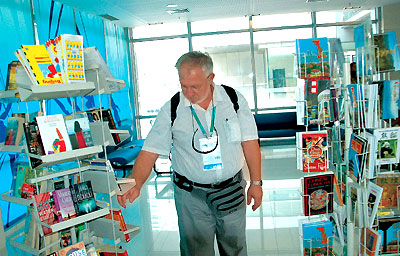Second-hand knowledge
Visitors to the Beijing Games may be able to buy Playboy and a raft of other limited publications as China mulls relaxing its controls for the Summer Olympics in line with international practice.

A visitor to Qingdao International Sailing Regatta, an Olympic test event held in August in the coastal city of Qingdao, checks out the lastest paperbacks on offer. [Courtesy of China National Publications Import and Export Corporation (CNPIEC)] |
All pornographic material is prohibited on the mainland but a temporary exception could be made for the Games, according to the biggest importer of foreign publications in the country.
"Our law forbids Playboy and we should obey this, but we can't rule out the possibility that it might make its debut. There might be a demand for it (from athletes or visitors) during the Games," said Liang Jianrui, vice-president of China National Publications Import and Export Corporation, which will manage the nine magazine-selling kiosks sanctioned by Olympic organizers BOCOG during the Olympic and Paralympic Games.
Each kiosk will retail over 100 kinds of newspapers and magazines, including publications that are difficult to find in the capital like The New York Times, Newsweek and Britain's The Sun famous for its topless Page 3 models.
"We will provide most of the world's top-selling newspapers and magazines," said Liang.
While Playboy, the brainchild of Hugh Hefner that is known for its "tasteful" photos of buxom beauties, remains a highly controversial choice at the Olympic Village, there is a growing trend in China to experiment with magazines that were once deemed dangerous or unsanitary.
China's increasingly liberal political climate has seen sweeping changes hit the shelves of bookstores in the last 18 months, with a Chinese edition of edgy music journal Rolling Stone now deemed fit for the Chinese reading public.
Other foreign media, like The New York Times, usually costs twice as much in Beijing as it does in Hong Kong - because of high tax rate and shipping costs, and is often restricted to five-star hotels, international compounds and special foreign bookstores.